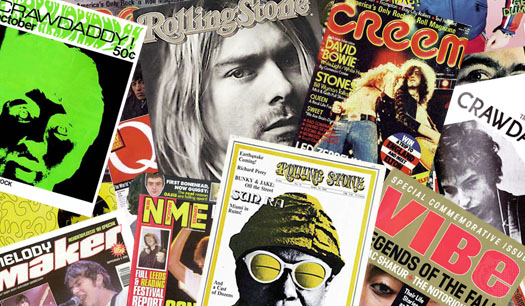What standards do we expect from music journalism today? Professionals who devote their careers to the discussion of music have the potential to shape our understanding of it in new and insightful ways, and their opinions are undoubtedly valuable— even if we disagree with them.
However, it’s becoming increasingly difficult to take any of these ‘professionals’ seriously. If you compare the kind of reasonable conversations that you have with a friend about an album to what a music publication has to say about it, you may be left utterly bewildered. There are plenty of older, and frankly, jaded, publications like Rolling Stone that have more or less given up on consistently covering music news; what’s concerning, however, is that the publications that do offer consistent coverage on new music have declined in quality.
Admittedly, there have been some pretty hilarious uses of creative freedom in reviews, but I think that there is fine line between humour and creativity, and irresponsibly altering or doing away with the conventional standards of evaluating music. Nowadays, major publications such as Pitchfork lean more toward the latter by consistently undervaluing meaningful commentary on an artist’s actual music. Instead, Pitchfork’s reviews are often disguised as ‘professional opinion,’ when in fact their content appeals mostly to vague truisms or an analysis of an album’s extrinsic social context. Sometimes, the focus on social context is so all-encompassing that reviews are more or less reduced to an expression of Pitchfork’s marketing strategy. Given the kind of power that major publications wield, not only in the industry itself but over the public as a whole, this phenomenon is immensely problematic: as ‘tastemakers,’ music writers have a responsibility to genuinely engage with the music itself, rather than focusing entirely on its cultural significance.
One prominent example that comes to mind is Pitchfork’s review of New Jersey punk band Titus Andronicus’ most recent album, The Most Lamentable Tragedy. A year ago, the band’s fourth full-length release hit the shelves with minor controversy when frontman Patrick Stickles sent some resentful tweets to a Pitchfork editor who was deciding between writing a piece about Kendrick Lamar and the anticipated new Titus Andronicus album. In short, Stickles criticized the editor for comparing his band to a “sneaker spokesperson” (referring to Lamar’s promotion deal with Reebok shoes) and later said that he thought that Lamar was a “phony.” Clearly, while Stickles’ attitude is not endearing, and calling one of the most talented and culturally relevant artists a “phony” doesn’t earn him any brownie points, by no means should this specific exchange (which occurred only weeks before the release of the album) affect the assessment of his music. Pitchfork seemed to disagree, because their review, released only a few weeks later, cited the Twitter exchange and discussed it in detail before actually delving into a meaningful discussion of the music itself.
Thematically, The Most Lamentable Tragedy was largely about Stickles’ personal mental health struggles, and the little social commentary that it did engage in was ultimately related to the frontman’s personal issues. Though the album wasn’t a massive success, it was well received by many of the band’s fans, and critics felt as though Pitchfork had withheld their all-important “best new music” endorsement partly due to the Twitter exchange.
Being granted the status of “best new music” by Pitchfork often means a serious career breakthrough for a lot of musicians, and can lift them into mainstream popularity. Therefore, it’s one thing if a major reviewer or publication with this kind of public influence genuinely happens to dislike a band’s music — but it’s another to be discouraging to any up-and-coming artists if the only thing that secures them praise in the eyes of music reviewers is simply the cultural or social significance of their work.
In many cases, Pitchfork has been correct to laud certain projects for their subversion of standards in the music industry or their socio-political relevance—Kendrick Lamar’s most recent full length LP, To Pimp a Butterfly, was one such case. But if the focus on context, or on cultural relevance, isn’t balanced against meaningful engagement with the actual music, then aren’t they missing the mark?
The beef between Titus Andronicus and Pitchfork is perhaps a special case, but I think that Pitchfork reviews writ large (even those that end on largely agreeable assessments) are stained with an emphasis on a work’s extrinsic worth, and generally lack the critical analysis of the actual music that should be required of major publications. Examples are ubiquitous, and range from cringe-inducing quasi-poetic ramblings to vaguely descriptive overviews of albums, with no effort to explicitly explain why anything is musically effective.
In any case, the publication has shown a consistent aversion to doing any real normative work when it comes to justifying the bold score number at the top of their reviews. It’s okay to like an album that others hate, it’s okay to dislike an album others love, and it’s even okay to weigh certain criteria differently than is perhaps the norm, but for any critical effort to be truly meaningful, you must at some point discuss the music itself.
This opens up a wider discussion about the place of socio-political and historical perspectives in music journalism. Indeed, there are instances when contextual information is absolutely integral to giving a balanced and thoughtful opinion on a work. Again, consider Kendrick Lamar’s To Pimp A Butterfly: the album was lauded as one of the most important releases in popular music in the past decade, and, given its own emphasis on socio-political commentary, any critical assessment that ignored or failed to discuss issues of social justice in the United States would be problematic.
However, is this a characteristic only relevant in a genre like hip-hop, where political resistance is ingrained in the history of the genre? Or does everything from classical music to disco deserve the same attention to contextual analysis, even when that context plays no immediate role in the music the artist has created? I suspect that the answer is “probably not.”


